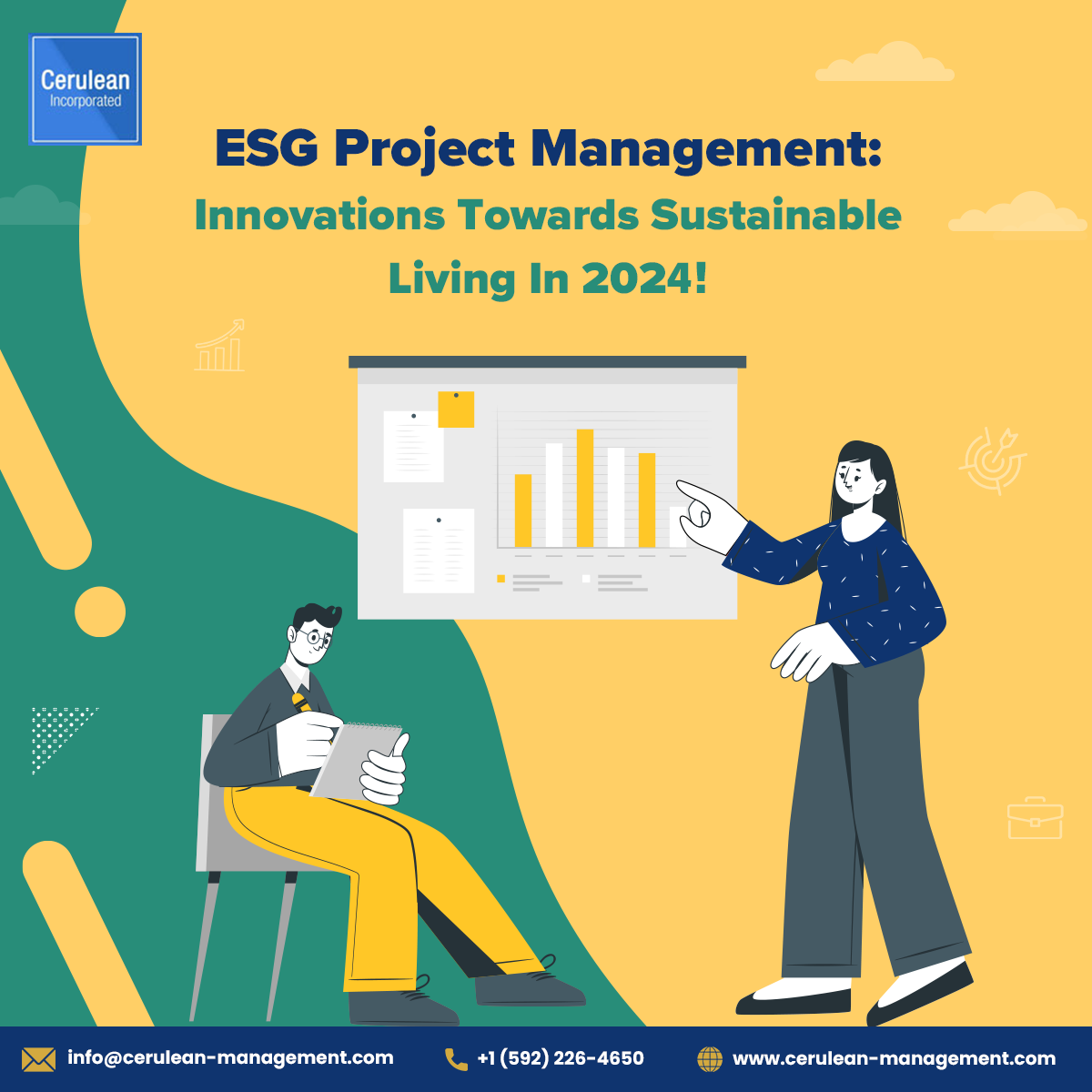
ESG project management is significant today in driving ethical practices with sustainable development in the growing business industries. ESG refers to Environmental, Social, and Governance aspects of business practices. Enterprises are strategizing ESG norms to encourage thoughtful growth, alleviate concerns, and enhance long-term value across the globe.
ESG project management is crucial for companies that aim to stay current in the market, meet regulatory needs, and respond to stakeholder demands. This blog will discuss its concept, latest innovations, and significance in business management services. So, let’s start by explaining how ESG is necessary for sustainable living in 2024.
Understanding ESG Project Management
What’s ESG? Let’s understand the various components of ESG in detail: Environmental, Social, and Governance. ESG checks the company’s sustainability and ethical impact on the industry, helping the PM team and owners evaluate the company’s long-term strategies and operations. Considering the business facilitation services, ESG has become a cornerstone of sustainable investing in today’s business. It guides corporate training services toward transparent yet responsible practices.
Sustainable investing is categorized as impact investing, socially responsible investing (SRI), and corporate governance. ESG investing is vital for businesses; it syncs a company’s financial goals with environmental and social values. This approach ensures that projects are economically viable, contribute positively to the environment and society, and adhere to robust governance standards.
The Trilogy – 3 Components of ESG Project Management Services!
ESG project management services involve incorporating various sustainable factors into project planning, execution, and monitoring. Let’s understand the three components of ESG in detail.
1. Environmental Considerations: It emphasizes decreasing the projects’ ecological footprint, including efficient resource utilization, waste management, carbon emissions, energy conservation, and minimization.
2. Social Impact: It ensures that your projects benefit the community, promote social equity, and improve the quality of life with fair labor practices, community engagement, and respect for human rights. It analyses company management relationships with employees, customers, communities, and suppliers.
3. Governance Standards: It recounts the company’s leadership, executive pay, audits, internal controls, and shareholder rights, stressing transparency, accountability, and ethical business practices. Governance practices ensure speedy decision-making processes that abide by industry regulations and ensure responsible and sustainable project management.
ESG is necessary today in business management services as it helps stakeholders concentrate on training and consulting options that adhere to sustainable and ethical business practices.
ESG – A Necessity in Project Management Services!
ESG investing comes with various advantages that modern companies today should enjoy. It moderates risks, boosts reputation, enriches ROI, promises regulatory compliance, and attracts top talent. Let’s understand each aspect in detail.
1. Financial Independence: Sustainable business practices can increase ROI, encouraging employee efficiency and creativity.
2. Getting the Right Talent: Top industry talents like working for companies that are responsible and ethical ecologically; thereby, enterprises that incorporate ESG practices attract the best industry candidates.
3. Regulatory Compliance: By incorporating ESG investing, businesses ensure that they comply with the ever-changing environmental and social regulations.
4. Risk Moderation: Investing in ESG allows companies to identify and manage risks wisely in environmental regulations, social issues, and governance practices.
5. Enhanced Reputation: Companies with strong ESG practices often enjoy a better reputation and increased trust among consumers and stakeholders.
Investing in ESG through business facilitation and project management services is crucial for modern businesses aiming to thrive in a competitive and conscientious market.
ESG-Focused Innovations in Business Management Services!
ESG-focused business planning involves strategic initiatives such as circular economy policies, impact investing, renewable energy adoption, supply chain transparency, and stakeholder engagement to drive sustainable growth and ethical operations.
1. Advanced Sustainability Metrics
The use of advanced sustainability metrics and tools is revolutionizing ESG project management. These metrics provide precise data on projects’ environmental and social impact, enabling better decision-making and reporting. Technologies like blockchain ensure transparency and accountability when tracking ESG metrics.
2. Stakeholder Engagement Platforms
An ESG project can only be successful if you implement effective stakeholder engagement. Various digital platforms are now available for investors, allowing smooth collaboration and communication. These creative platforms offer real-time updates, collect reliable feedback, and ensure effective responses for perfect project incorporation.
3. Circular Economy Practices
A combination of consumption and production is called a circular economy. Adopting this principle in project management services is a creation in itself. Using this strategy, companies can eliminate waste of products and materials and regenerate natural systems. Enterprises design projects using end-of-life considerations and promoting recycling and reuse.
4. Machine Learning and Artificial Intelligence (AI)
Machine Learning (ML) and Artificial Intelligence (AI) are critical in ESG project management. These technologies examine large datasets, foresee outcomes, augment the allocation of resources, and automate processes. AI-driven tools can identify potential ESG risks and opportunities, facilitating proactive management.
5. Green Building Technologies
The construction and real estate sectors are experiencing a rise in green building technologies. Creativity that helps decrease the environmental impact of construction projects are energy-efficient designs, sustainable materials, and intelligent building systems. LEED certifications are considered a standard norm for green buildings.
6. Renewable Energy Integration
Most industries follow the norm of integrating renewable energy sources into projects. Technologies associated with renewable energy, such as solar, wind, and more, allow project sites and operations to reduce their carbon footprint to a great extent. This practice promotes environmental sustainability and enhances energy security.
7. Sustainable Supply Chain Management
In ESG project management, companies must ensure sustainability across the supply chain. Innovations in supply chain management enhance transparency, traceability, and accountability; they include IoT and blockchain. These technologies help manage and keep a check on the environmental and social impacts of the supply chain.
8. ESG Training and Education
Enterprises find investing in ESG training and education for project management teams crucial. Training programs and certifications in ESG principles and sustainable project management practices are gaining popularity today, ensuring professionals with knowledge and skills for sustainable business management services.
9. Carbon Footprint Reduction Strategies
Strategies to reduce the carbon footprint are being integrated into project management practices. This includes the adoption of energy-efficient technologies, carbon offset programs, and the implementation of low-carbon solutions. Companies are setting ambitious carbon reduction targets and developing action plans to achieve them.
10. Impact Investing
Impact investing is gaining popularity nowadays. Investments in this policy are made to generate positive, measurable social and environmental impact alongside the company’s ROI. It also promotes funding projects that abide by ESG principles, offering sustainable development.
These steps are crucial for integrating ESG principles into business planning, driving sustainable growth and ethical practices.
Shaping a Sustainable Future of Today’s Business
Businesses should focus on ESG business planning and implementation, as it contributes significantly to a healthier future and environment. It also boosts company reputation and ROI, driving positive societal change. Collaborate with agencies offering business consulting and corporate training services to ensure your team is well-equipped to navigate the ESG complexities.
ESG project management is no longer an option; it’s necessary for organizations promoting sustainable development practices. The 2024 creativity level transforms project management, whether advanced sustainability metrics or AI-driven tools. So, what are you waiting for? Make a lasting impact on the world with ESG project management and business facilitation services.
